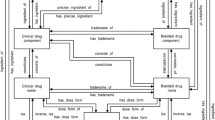Abstract
The Medical Dictionary for Regulatory Activities (MedDRA) is a multi-axial, five-tiered hierarchical terminology used by regulatory authorities and the biopharmaceutical industry for the coding (classification) of clinical data in adverse event/adverse drug reaction (AE/ADR) reports. The terminology — developed by the International Conference on Harmonisation of Technical Requirements for Registration of Pharmaceuticals for Human Use (ICH) — is maintained by an independent organization that distributes MedDRA via subscription. The activities of this organization — the Maintenance and Support Services Organization — are overseen by the MedDRA Management Board, which itself reports to the ICH Steering Committee.
MedDRAwas developed to overcome some of the limitations of previousAE/ADRcoding terminologies and to provide a single, multilingual resource for the classification of AE/ADRdata. Currently, MedDRA’s use is mandated for various types of regulatory reporting in the EU and Japan; it is widely used by the biopharmaceutical industry in all three ICH regions (US, EU and Japan). The US Food and Drug Administration has used MedDRA in its Adverse Event Reporting System for over a decade.
MedDRA provides a robust, vigorously maintained standard terminology for AE/ADR reporting with sufficient granularity of concepts and logical medical groupings within its hierarchy of terms. However, because of the size and specificity of MedDRA, as well as the organization of some of its groupings, retrieval and aggregation of coded AE/ADR data can sometimes present a challenge. Standardised MedDRA Queries (SMQs) have been developed in part to address this challenge. As of the time of writing, there are nearly 70 SMQ topics available to MedDRA users.
MedDRA’s use continues to expand 10 years after its official launch, driven primarily by the needs of — and input from — its user community.







Similar content being viewed by others
Notes
MedDRA is a registered trade mark owned by the International Federation of Pharmaceutical Manufacturers Associations.
References
Introductory guide, MedDRA version 12.0, March 2009 [online]. Available to MedDRAsubscribers from URL: http://www.meddramsso.com/translations/translationdownloads.htm [Accessed 2009 Apr 1]
Mozzicato P. MedDRA — past and future. Regul Aff J Pharma 2006; 17 (12): 797–805
Wood KL. TheMedical Dictionary for Drug Regulatory Affairs (MEDDRA) project. Pharmacoepidemiol Drug Saf 1994; 3: 7–13
Brown EG, Wood KL, Wood SM. The Medical Dictionary for Regulatory Activities (MedDRA). Drug Saf 1999; 20 (2): 109–17
Cone M. Regulatory update: the long-awaited MedDRA has arrived! Good Clin Pract J 1999; 6 (1): 42–3
Huntley K, Veverka MJ, Golden M. The FDA’s medical dictionary for drug regulatory affairs alpha test. Drug Inf J 1995; 29 (4): 1133–43
MedDRA term selection: points to consider, release 3.12, 1 April 2009 [online]. Available from URL: http://www.meddramsso.com/MSSOWeb/document_library/9491-1200_TermSelPTC_R312_mar2009.pdf [Accessed 2009 Apr 1]
MedDRA data retrieval and presentation: points to consider, release 2.0, 1 April 2009 [online]. Available from URL: http://www.meddramsso.com/MSSOWeb/Document_Library/9610-1200_DatRetPTC_R20_mar2009.pdf [Accessed 2009 Apr 1]
Zhao-Wong A, Rump E, Moraleda T, et al. Proposed terminology changes to facilitate the analysis of MedDRA-coded data. Drug Inf J 2006; 40: 291–303
Brown EG. Effects of coding dictionary on signal generation: a consideration of the use of MedDRA compared with WHO-ART. Drug Saf 2002; 25 (6): 445–52
Brown EG. Using MedDRA: implications for risk management. Drug Saf 2004; 27 (8): 591–602
Fescharek R, Kübler J, Elsasser U, et al. Medical Dictionary for Regulatory Activities: data retrieval and presentation. Int J Pharm Med 2004; 18 (5): 259–69
Tonéatti C, Saïdi Y, Meiffrédy V, et al. Experience using MedDRA for global events coding in HIV clinical trials. Contemp Clin Trials 2006; 27: 13–22
Tremmel LT, Scarpone L. Using MedDRA for adverse events in cancer trials: experience, caveats, and advice. Drug Inf J 2001; 35: 845–52
Brown EG, Douglas S. Tabulation and analysis of pharmacovigilance data using the Medical Dictionary for Regulatory Activities. Pharmacoepidemiol Drug Saf 2000; 9: 479–89
Introductory guide for Standardised MedDRA Queries (SMQs) version 12.0, March 2009 [online]. Available to MedDRA subscribers from URL: http://www.meddramsso.com/translations/translationdownloads.htm [Accessed 2009 Apr 1]
Lindquist M. VigiBase, the WHO global ICSR database system: basic facts. Drug Inf J 2008; 42: 409–19
Acknowledgements
The author is a member of the MedDRA Maintenance and Support Services Organization (MSSO) within Northrop Grumman Information Systems. MSSO does not own MedDRA but distributes it via subscription. MSSO also provides MedDRA-related services (e.g. training) to subscribers. No sources of funding were used to assist in the preparation of this article.
Author information
Authors and Affiliations
Corresponding author
Rights and permissions
About this article
Cite this article
Mozzicato, P. MedDRA. Pharm Med 23, 65–75 (2009). https://doi.org/10.1007/BF03256752
Published:
Issue Date:
DOI: https://doi.org/10.1007/BF03256752




